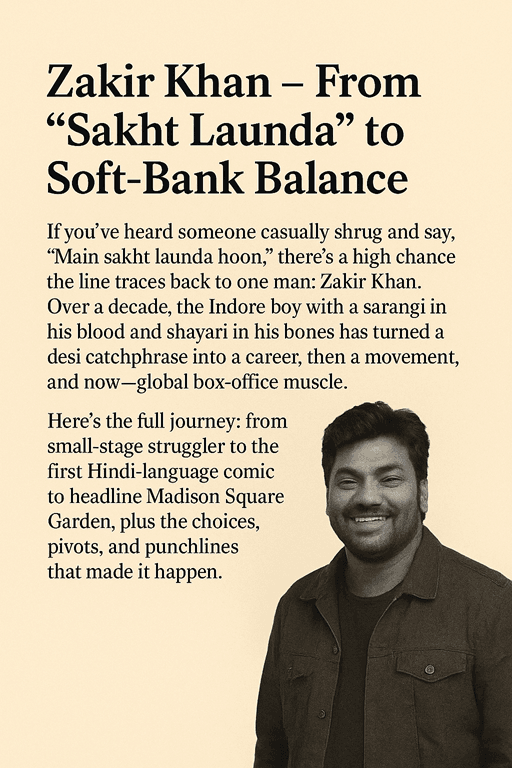If you’ve ever heard someone casually shrug and say, “Main sakht launda hoon,” there’s a high chance the line traces back to one man: Zakir Khan. Over a decade, the Indore boy with a sarangi in his blood and shayari in his bones has turned a desi catchphrase into a career, then a movement, and now—global box-office muscle. Here’s the full journey: from small-stage struggler to the first Hindi-language comic to headline Madison Square Garden, plus the choices, pivots, and punchlines that made it happen.
Roots: Music, mehfil, and a mic
- Born: 20 August 1987, Indore, into a family of classical musicians; grandson of sarangi maestro Ustad Moinuddin Khan.
- Early leanings: A diploma in sitar, college dropout, and a poet at heart who wrote and recited at Urdu literature gatherings before discovering the stage’s sharper adrenaline.
Those beginnings show up everywhere in his style—long, unhurried stories; rhythm like a bandish; and punchlines that land like a perfect tihai.
Breakthrough: The year everything changed (2012)
Zakir’s public arc really starts when he wins Comedy Central’s “India’s Best Stand Up” in 2012—instant validation inside a tiny but exploding stand-up scene. The same years see him writing, performing, and popping up on NDTV Prime’s The Rising Stars of Comedy and On Air with AIB, sharpening a voice that sounded familiar to small-town India but fresh to metros.

Building a persona: “Sakht Launda”—tough love, tender heart
The “sakht launda” bit—guy with self-control who won’t get swayed by romance—became a meme, a shield, and a mirror for young men navigating love and ego. It gave Zakir a brand that was relatable and extremely quotable.
The Amazon era: Specials that scaled the ceiling
If YouTube clips made him famous, hour-long specials made him durable:
- Haq Se Single (2017) – classic Zakir: dating foibles, room-temp bravado, warm callbacks.
- Kaksha Gyarvi (2018) – school-days nostalgia weaponised into thunderous applause breaks.
- Tathastu (2022) – a tonal pivot: grief, family, legacy; still funny but deeper, slower, riskier.
- Mannpasand (2023) – the writer-performer in form; a conscious evolution post-Tathastu.
- Delulu Express (2025) – a cine-sized, 94-minute ride that premiered globally on Prime Video.
Each special widened the audience and deepened the moat. Ticket sales followed.
Storyteller to show-runner: The “Ronny” universe
Zakir didn’t stay only on stage. He created and starred in Chacha Vidhayak Hain Humare—the Ronny Bhaiya saga that began in 2018, returned in 2021, and dropped a third season in April 2024. It’s small-town ambition, jugaad, and lovable lies, dialled to sitcom.
He also mentored the next crop as a judge on Comicstaan—cementing his place as a pillar of the Indian stand-up ecosystem.
Poetry never left
Between specials and shoots, Zakir kept the shayar alive—performing at festivals, weaving nazm-like passages into sets, and hosting mushaira-style formats on stage and streaming. That blend—mohalle ki baat with mehfil ki tehzeeb—remains his unique texture.
The global turn: arenas, tours… and Madison Square Garden
2023–25 supercharged the international calendar. The decisive flex came on 17 August 2025, when Zakir headlined a sold-out, all-Hindi stand-up show at Madison Square Garden—the first Hindi comic to do so. The moment went viral when he video-called his parents from the stage to show them the roaring crowd. A proud, very Indian flourish.
The other side of virality: criticism and course-correction
With the megaphone comes magnification. Alongside MSG headlines, old clips resurfaced and sparked accusations of sexism around the “sakht launda” era—leading to debate about how humour ages and what responsibility comics carry as culture scales global. It’s a reminder that growth in reach demands growth in frame.
What powered the rise (so you can steal the playbook)
- Voice market-fit: Targeted the massive Hindi belt and diaspora with specificity, not translation.
- Format mastery: Crisp YouTube storytelling → hour-long specials → character-led series → arena tours.
- Cultural code-switching: Shayari’s softness with stand-up’s sharpness; small-town realities with metro stages.
- Platform leverage: Early, consistent partnership with Prime Video.
- Community flywheel: Quotable lines (“sakht launda”), recurring characters (Ronny), and a listener-first stage presence that feels like a late-night adda.
From “Sakht Launda” to Soft-Bank Balance
No, we don’t have his passbook—but the trajectory is obvious: five global streaming specials, a three-season show he created and stars in, arena tours, and MSG bragging rights. That’s not just fame; that’s compounding. The “soft-bank balance” here is less about digits and more about durable equity: a language moat, a character universe, and a fan base that ages with him.
Timeline: The highlights at a glance
- 2012: Wins India’s Best Stand Up (Comedy Central).
- 2016: National visibility via AIB collaborations.
- 2017–18: Haq Se Single, Kaksha Gyarvi.
- 2018: Chacha Vidhayak Hain Humare Season 1.
- 2019: Judge on Comicstaan S2.
- 2021: Chacha… Season 2.
- 2022: Tathastu.
- 2023: Mannpasand.
- Apr 2024: Chacha… Season 3.
- Mar 2025: Delulu Express.
- Aug 2025: MSG—first all-Hindi headliner, sold out.
Lessons from Zakir’s playbook (for creators and hustlers)
- Own a lane: Language isn’t a barrier; it’s a brand.
- Evolve the act: From quick hits to long arcs—audiences reward ambition.
- Build IP, not just sets: Characters and shows travel further than clips.
- Mentor to multiply: Teaching on platforms like Comicstaan grows the pie—and your permanence.
- Lean into roots: The more he sounded like home, the farther the world listened.
The road ahead
Post-MSG, expect larger North American and Gulf arena runs, more cinematic stand-up on streaming, and—if the Ronny-verse holds—spin-offs or films that keep the Indore-to-India flavour intact. The “sakht” image has softened with age and success; the storyteller remains the core product.
In short: Zakir Khan didn’t just break through; he built a bridge—between mohalla humour and global marquee, between shayari and stadiums. And yes, somewhere along the way, the “sakht launda” figured out a very soft, very healthy bank balance to match the size of his audience.
